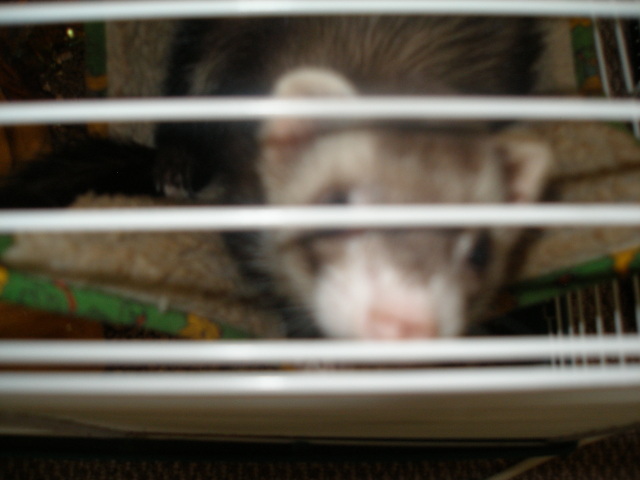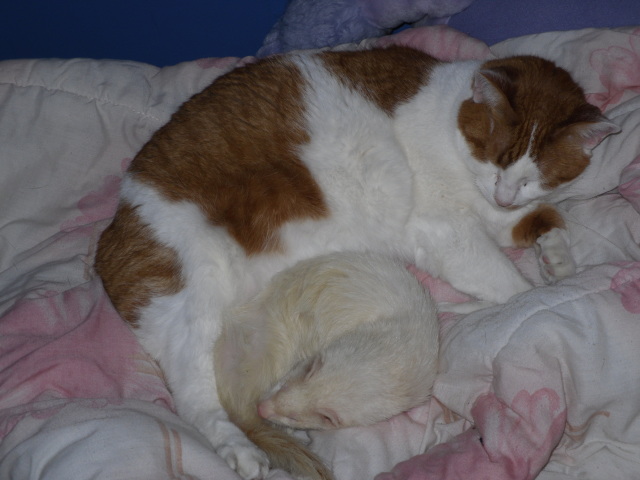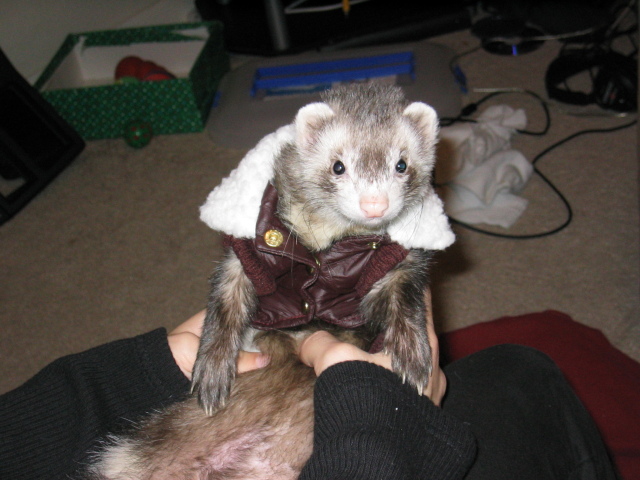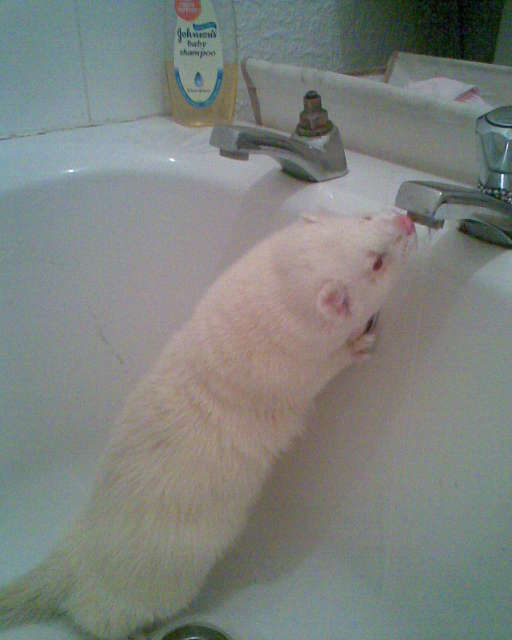Questionone of my two male ferrits is losing some of his hair on his tail by his butt. It doesn't seem to bother him, there is no rash look and he doesn't scratch it or anything. He doesn't act sick, still eating & using the bathroom well %26 is active with the other ferrit in the cage. The hair loss is about an inch long. Why is it gone & what can I do about it?
AnswerHi Mark:
Hairloss as you are describing is quite typical of early adrenal disease. It usually starts right at the base of the tail and may or may not grow back the first time it happens. If it grows back, it does NOT mean tne disease no longer exists; it's just a fluke. Left untreated, adrenal disease will continue to cause the ferret's fur to fall out, sometime along the same line, sometimes just in a patchy way, but always ending up with a 99% naked ferret in the end.
Other symptoms you may notice early on are possible increased aggressivenes towards his cagemate(s) while playing due to increased male hormone production and lots of itchiness and dry skin. These too are progressive symptoms typical of adrenal disease.
Here are some great links about adrenal disease that you will want to read up on so you will know as much as possible about this disease - you have some decisions to make in the fairly near future! Here are some great links:
ADRENAL DISEASE:
* http://www.petcarevabeach.com/adr.html
LUPRON as treatment:
* http://miamiferret.org/fhc/lupron.htm
Adrenal FAQ from Ferret Central:
* http://www.ferretcentral.org/faq/med/adrenal.html
ADRENAL CRYOSURGERY
* http://www.miamiferret.org/fhc/cryosurgery.htm
Additionally, some "brief" information is that melatonin was once thought to be effective against adrenal tumors, however, after some brief experimentation was found to be basically useless, although cheap, very painful injections for the ferret and just plain not recommended anymore. Also, you may run into a vet who recommends a Tennesssee Panel to help in diagnosing your ferret's adrenal disease. This test is very expensive, is only about 50% accurate, and you have basically nothing in the end, so most experienced vets will just go ahead and open the ferret to "explore" rather than go thru this basically useless test.
Adrenal disease is completely curable WITH SURGERY ONLY. Removal of the tumors from the adrenal gland is the ONLY cure. In old or sick ferrets, or ferrets with second instances of adrenal disease (yes it can happen, as there are two adrenal glands, right and left), Lupron Depot injections are sometimes recommended. These injections are to RELIEVE SYMPTOMS ONLY and the tumors inside will continue to grow, so unless the ferret is already known to be terminal, it's usually not really a good first choice.
Cost of adrenal surgery can range from $250 to $1,000 depending on th vet and the clinic/hospital. If there is a vet teaching hospital near you, that's your best bet - even if it's within a day or so's driving distance it's worth the trip and motel bills generally. It always pays to call around and compare prices AFTER YOU HAVE A DIAGNOSIS FROM A LOCAL VET ONLY. So, step 1 is to get a local diagnosis of adrenal disease. Step 2 would be to start comparing prices by calling vets in and out of your area (places you would like to visit?) and see what they charge for the surgery, but you MUST be sure you are comparing "apples with apples". For that reason, it's a good idea to ask something similar to this: "What is your basic price for a right-sided adrenalectomy on a ferret, with no complications". That does NOT mean your ferret will have a right sided adrenal gland affected - it actually may be his left side gland, which would be much more expensive because it is often wrapped around the aorta, the largest blood vessel in the body that extends from the heart and suddenly a 'routine' surgery becomes a very very life-threatening surgery that only the best surgeons do and the price goes up accordingly. BUT, it does give you something to compare if you ask the same question the same way each and every time....just understand that may not be the price you end up with.
Once you've decided on a vet or two, you will want to meet them and have them examine your ferret and talk about surgery and be sure in your mind that you want this vet to take your ferret's very life in his/her hands. Adrenal surgeries CAN be very routine, but they CAN turn very life threatening very quickly, so be sure you trust your vet and he/she is very experienced. Experienced vets are not necessarily more expensive! Often a surgeon who does a lot of ferret adrenalectomies will own the cryosurgery machine, which makes quick work of an adrenal surgery. So, there are a LOT of variables. Know this going in and you won't get disappointed.
Having a male ferret, time is of the essence for you. As the adrenal gland grows, it will impinge upon the prostate gland and make it difficult for him to urinate; then impossible for him to urinate and this in itself can actually kill the ferret (very very painfully, I might add). So, you should start looking into the first few steps right away and deciding what you will do.
Of course there is always the option of putting the ferret down as soon as he gets uncomfortable, but I think you will be surprised how quickly that will happen, especially with a male ferret and the prostate issues. Lupron Depot injections can always buy you a little more time while you either save up money for surgery OR find the right vet, but as a "cure", it's useless. Being completely curable, it's horribly sad when a ferret gets adrenal disease and does not get the surgery to cure it, so I hope you will strongly consider the surgery.
Once you get closer to the surgery portion, you will need information on how to set up a hospital cage, information on hand feeding your ferret while he is sick and recovering, making sure he has enough fluids those first few days post-surgical, and lots of other information. I can help you with that when the time comes. For now, just start locating a vet and learning all you can about adrenal disease. Shelter moms are great sources of information on cheap vet care (they have to operate on a shoestring budget and all their 'kids' get adrenal surgeries), so I will attach not only a list of vets, but a list of ferret shelters. Check both lists for vets and shelters in your area and start there (or the closest largest city nearby is a good place to start looking for lowest prices for surgery). Here is the shelter list:
SHELTERS/RESCUES - U.S.
* http://www.ferret.org/links/shelters.shtm
* http://www.everythingferret.com/ferret_shelters.htm
* http://groups.msn.com/Ferret/yourwebpage5.msnw
* http://www.ferretcentral.org/for-others/db-products.html
* http://www.ferretfacts.com/ferret-shelter-directory-us-ferret-shelters.html
And here is the list of vet 'lists' compiled by other ferret owners:
VETS USA:
* http://www.quincyweb.net/quincy/vet.html
* http://ferrethealth.org/vets/
* http://www.ferret-universe.com/vets/vetlist.asp
* http://www.ferretsanctuary.com/vets.shtml
* http://www.ferretcentral.org/for-others/db-vets.html
* http://ferrethealth.org/vets/
If your ferret is extremely itchy now, you may rub just plain Vaseline on the bare spots of his skin to help keep it soft and moist. He will probably lick it off, but that's good for him too, because petroleum jelly is one of the basic ingredients in ferret laxatives to help him pass through any furballs he may have already accumulated while this fur was falling out.
Please stay in touch and don't hesitate to write again and let me know when you are ready for additional information on where to go from here. Adrenal disease IS completely curable - you just must be smart and you must be ready for it. My thoughts and prayers are with you and with your little guy too. (P.S.: AD is NOT contagious, so no reason to separate the playmates as long as they don't get too rambunctious in their wrestling. Of course, always separate any ferret fight that ends is the attackee pooping, any blood drawn, or constant attacking. It's not his fault that he is this way - it's his hormones, so please don't punish him, but do protect the other ferret from any injury)...separate cages ONLY if completely necessary.
Sincerely,
Jacquie Rodgers

 ferret losing weight seems listless
Question
mario
Hello my daughters ferret is a neutered
ferret losing weight seems listless
Question
mario
Hello my daughters ferret is a neutered
 ferrets jaw doesnt open far
Question
Rodney and Harry
I have a 2 year old ferret th
ferrets jaw doesnt open far
Question
Rodney and Harry
I have a 2 year old ferret th
 Poisonous outdoor plants.
QuestionHi, Cindy. I had a question thats been spinning
Poisonous outdoor plants.
QuestionHi, Cindy. I had a question thats been spinning
 Eros
Question
Eros
Hello. My ferret, Eros, just turned
Eros
Question
Eros
Hello. My ferret, Eros, just turned
 ferret love
Question
snert
hi my name is john from england i had to
ferret love
Question
snert
hi my name is john from england i had to